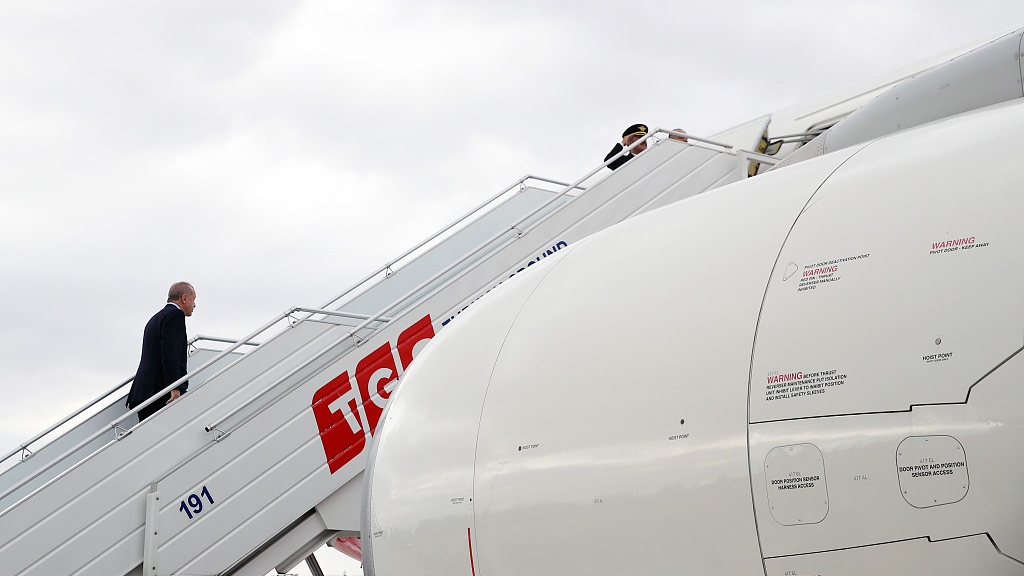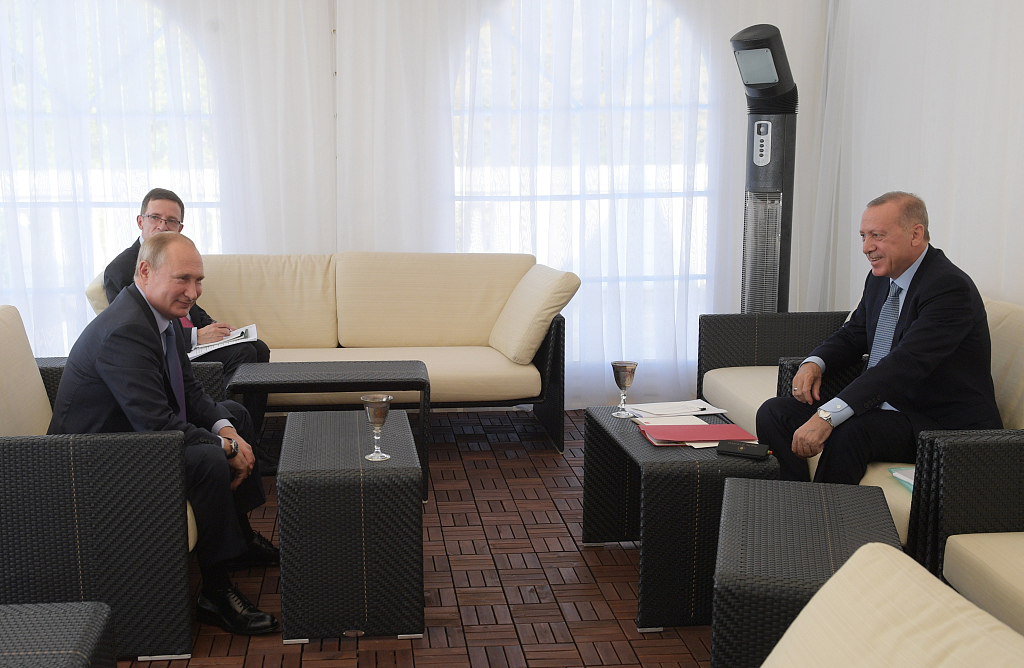
President of Turkey, Recep Tayyip Erdogan (L) departs to Russia at Esenboga Airport in Ankara, Turkey, October 22, 2019. /VCG Photo
President of Turkey, Recep Tayyip Erdogan (L) departs to Russia at Esenboga Airport in Ankara, Turkey, October 22, 2019. /VCG Photo
Editor's Note: Wang Jin is a research fellow of Charhar Institute in China and a research fellow from Syria Research Center of Northwest University in China. The article reflects the author's opinions, and not necessarily the views of CGTN.
After his meeting with Russian President Vladimir Putin in Sochi of Russia, Turkey's President Recep Tayyip Erdogan reached his major objectives concerning northern Syria, and the six-hour meeting might pave way for the future success of Syria's reconstruction, but risks still remain.
It was the eighth meeting between Erdogan and Putin this year, and the personal ties between the two leaders were so close that there were only two of them and an interpreter meeting in a room. Only on very few occasions, some members of the delegation were called in to answer some questions. After the long meeting, two leaders reached a 10-point joint memorandum, which covers most concerns of Turkey over the Syria issue.
According to the memorandum, both Turkey and Russia secured their respect for Syria's "territorial integrity" and the state's "political unity." Meanwhile, the "national security of Turkey" was also highlighted, and it shows that Russia sees the future of Syria's reconstruction connected with the "security" of Turkey in the region. Erdogan's major concerns in Syria - the establishment of a "buffer zone" in northern Syria, and the objective of eliminating the presence of the Syrian Kurdish Democratic Union Party (PYD) are also respected by Moscow.
For Turkey, a major "surprise" comes from Russia's responsibility with regards to maintaining the security of the Turkey-Syria border area. According to the memorandum, "Russian military police and the Syrian border service" would be introduced in "the Syrian side of Syrian-Turkish border", while "joint Russian-Turkish Patrols will begin to a depth of 10 km" inside northern Syria. Russia, according to these items, would be responsible for both the withdrawal of PYD in northern Syria and the coordination with the Syria government to secure the implementation of the memorandum.
However, Ankara also promised to make some concessions. On the one hand, Turkey secured its support to the political reconstruction process led and organized by Russia, and Ankara needs to persuade some opposition groups to negotiate with the Syrian government.
In the memorandum, Turkey recognized the Syrian Constitutional Committee as the key mechanism for the political process in Syria. After the mechanism was advocated by Russia in early 2018, very little progress was made. The Syrian opposition groups have remained divided, while any concession towards the Syrian government could be perceived as "betrayal" by other opposition groups. On the other hand, Turkey needs to negotiate directly with the Syrian government and abandon its long-held principle of "Assad Must Go."

Russian President Vladimir Putin meets with his Turkish counterpart Recep Tayyip Erdogan in the Black Sea resort of Sochi, Russia, October, 22, 2019. /VCG Photo
Russian President Vladimir Putin meets with his Turkish counterpart Recep Tayyip Erdogan in the Black Sea resort of Sochi, Russia, October, 22, 2019. /VCG Photo
However, given the dominant role of the Syrian government on the battlefield, and the fragile ties between different Ankara-supported rebel groups, it is necessary for Turkey to re-establish the official ties with Damascus.
The fourth point of the states that Russia will help Ankara and Damascus implement the Adana Agreement, which was signed between Syria and Turkey in 1998 with the aim of suspension of mutual hostility. To re-implement the Adana Agreement in 1998 means that Turkey needs to recognize the legitimacy of the Syrian government and to suspend its support to Syrian rebel groups, and this would be a major shift of Turkey's foreign policy in Syria.
Erdogan's visit to Sochi ended with a diplomatic victory, while Turkey's major concerns in Syria, both to establish a "buffer zone" in northern Syria and to eliminate the presence of Syrian rebel groups in the "buffer zone" were supported by Moscow. Given that before Erdogan's visit to Russia, he had reached a "ceasefire" in northern Syria with the mediation of U.S. vice president Mike Pence while U.S. would help the withdrawal of PYD members from northern Syria, Erdogan's objectives in Syria received approval from two major powers, U.S. and Russia.
However, challenges still remain. The first concerns the difficulty of defining the "withdrawal" of PYD members. After Turkey's latest military offensive in northern Syria of early this month, PYD and Syria government started to cooperate and many PYD members in northern Syria joined the Syria government forces by changing their uniforms and raising Syrian flags. Some PYD members could still remain in northern Syria with the identity of "Syrian government forces."
On the other hand, the attitude of Damascus is still unknown. Both establishing a "buffer zone" and withdrawing PYD from northern Syria, requires the Syrian government's cooperation. However, according to remarks made by the Syrian government, Turkey is still described as "invader," while the Syrian opposition groups are still "terrorists". The establishment of a "buffer zone," although approved by the U.S. and Russia, might not be easily accepted by the Syrian government.
Erdogan achieved a major diplomatic victory with the memorandum, and Turkey's dominant role in northern Syria is accepted and recognized. However, the future of Syria's reconstruction process is still full of uncertainties, and the rapprochement of Ankara and Damascus is still a difficult task.
(If you want to contribute and have specific expertise, please contact us at opinions@cgtn.com.)